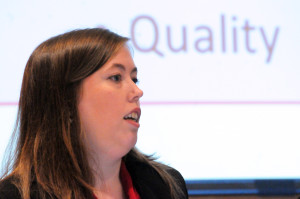by Katerina Souliopoulos, 2014 Summer Intern, Health Law and Policy Clinic

Clinical Fellow Maggie Morgan presents on the importance of integrated, whole-person care for people living with Type 2 Diabetes.
On June 9th, the Center for Health Law and Policy Innovation (CHLPI) hosted the Western North Carolina Diabetes Strategy Forum at UNC – Asheville in order to address diabetes prevention and management throughout the Western region of the state. The population of Western North Carolina has a particularly high rate of diabetes at 12%. Western North Carolina faces particular regional challenges in preventing and managing type 2 diabetes, such as a lack of public transportation to medical services, low access to healthy food, and a shortage of medical providers. The strategy forum convened local diabetes leaders from a range of disciplines including endocrinologists, clinical pharmacists, certified diabetes educators, and community health workers for an in-depth conversation about the current state of the disease in Western North Carolina and how to best move forward.
Harvard Law Professor and Director of CHLPI, Robert Greenwald, kicked off the event along with Patti Doykos, Director of the Bristol-Myers Squibb Foundation. The introductions highlighted the importance of the recommendations within CHLPI’s comprehensive 2014 North Carolina State Report Providing Access to Healthy Solutions (PATHS) – The Diabetes Epidemic in North Carolina: Policies for Moving Forward. Both Greenwald and Doykos emphasized that the Forum is only the first step in identifying opportunities for policy reform and eexpressed commitment to transforming the report’s research into advocacy and reform efforts.
Participants in the Strategy Forum heard from Dr. Wendy S. Lane of the Mountain Diabetes and Endocrine Center in Asheville about the gaps in care for people living with diabetes. Dr. Lane explained that a combination of providers having little time to spend with patients and a lack of diabetes-specific training and education often resulted in delayed referrals from primary care doctors to specialists, putting patients at risk of developing complications. For example, Dr. Lane related an experience in which a patient came to her that had been living with diabetes for over 18 years. By the time Dr. Lane saw the patient, he had bleeding in his right eye and nerve damage in his legs. During those eighteen years, just one mile from Dr. Lane’s office, his primary care physician had attempted to manage his treatment with a kind of insulin that had been disfavored for at least a decade. Dr. Lane’s anecdote highlights the need for better diabetes-specific training incorporated into medical school curricula, and timely referrals to specialists. Dr. Lane recommended that medical residents spend at least four weeks practicing under trained endocrinologists, especially as diabetes is one of the most common conditions they’ll see as primary care providers practicing in Western North Carolina.
The Forum also included a panel discussing diabetes prevention and management initiatives throughout Western North Carolina. The panel included:
- · Rick Davis, Executive Director, Graham Revitalization Economic Action Team (GREAT)
- Presenting on Graham County’s Greenway Project and the Reimagining Robbinsville project. Each project will revitalize Robbinsville’s downtown, while increasing sidewalk connectivity and cultivating a community of walking and biking.
- · Suzanne Landis, MD, MPH, Director, Division of Healthcare Innovation; Director, Center for Healthy Aging, Mountain Area Health Education Center
- Presenting on the potential benefits of Accountable Care Organizations (ACOs) within the Western North Carolina hospital network. ACOs are groups of various medical providers who join together to deliver coordinated care to patients in the hopes of increasing quality of care while decreasing cost.
- · Katie Souris, Coordinator of Preventive Health & Diabetes Wellness and Prevention Program, YWCA of Asheville and WNC
- Presenting on the YWCA’s Diabetes Wellness and Prevention Program. Participants in the program receive personal fitness training, diabetes education from medical providers and other health professionals, and access to support groups and cooking classes.
- · Wendy S. Lane, MD, Clinical Endocrinologist & Director of Research, Mountain Diabetes and Endocrine Center
The forum concluded with a roundtable discussion in which participants identified priorities for improving diabetes prevention and management within Western North Carolina in the coming years. Community leaders addressed several themes, such as increasing collaboration and communication among providers and community health resources, educating patients on proper diabetes self-management techniques, and increasing insurance coverage for prevention and management programs. They also learned of one another’s great work within the region and forged new connections that will advance the goal of improving access and quality of diabetes healthcare in Western North Carolina.
————–
The views reflected in this blog are those of the individual authors and do not necessarily represent those of the Center for Health Law & Policy Innovation or Harvard Law School. This blog is solely informational in nature, and not intended as a substitute for competent legal advice from a licensed and retained attorney in your state or country.


Health Law & Policy, Commentary
Braidwood Management v. Becerra: Updated FAQs for Health Advocates and Providers
July 22, 2024